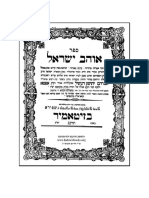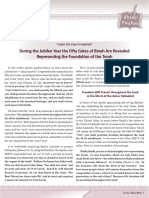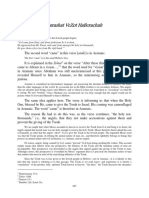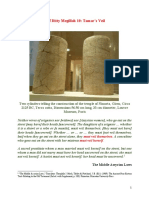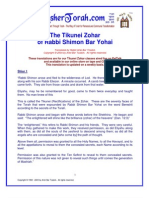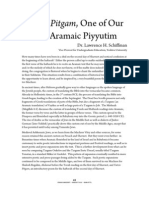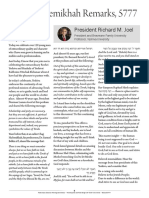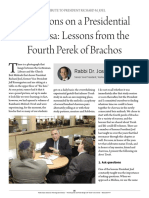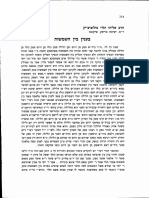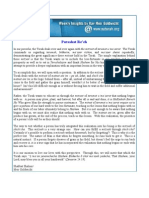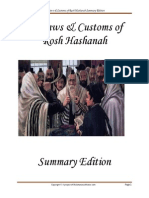The Wicked Gatherer: Volume XIV - Issue 23 The DRS Weekly Torah Publication
Uploaded by
outdash2The Wicked Gatherer: Volume XIV - Issue 23 The DRS Weekly Torah Publication
Uploaded by
outdash2~"ca
Volume XIV - Issue 23
The DRS Weekly Torah Publication
H
A
L
B
n
a
a
:
H
A
L
B
The Wicked Gatherer
By Yoni Kadish, 12th Grade, Editor of Student Articles
DR3\ D3"
T
he Gemara in Sanhedrin tells us that the night the Meraglim reported about their journey to Bnei Yisrael
was Tisha Bav. Hashem decreed that because they had cried for no reason, in the future, on that night they
would have reason to cry. The Gemara continues to explain that in the Megillah Eicha we put the peh,
mouth, before the ayin, eye because the Meraglim put their mouths before their eyes when they reported with their
mouth what their eyes didnt see.
From that Gemara it appears that the Meraglim should have kept silent instead of reporting what they did-
nt see. But, we know that the Meraglim actually reported exactly what they saw. They reported that Eretz Israel is
a land that eats its inhabitants and a land filled with giants. Chazal, in fact, report that the Meraglim saw people
who were dead and giants roaming the land. So, what does the Chazal mean that they placed their mouths before
their eyes?
Rav Schwalb, in Mein Beis Shoeva, shares a beautiful insight about vision. Two people can see the same
event but, report it in two different ways depending upon their dispositions. Some can see sparks of holiness, while
(Continued on page 7)
Putting Their Mouths Before Their Eyes
By Rabbi Elly Storch, Assistant Menahel
):(
...And they found a man gathering wood on the Sabbath day (15:32)
T
he Gemarah in Shabbos (150b) relates a story about a pious man who had
a breach on his fence on Shabbos. On Shabbos he decided to fence in the
breach, inadvertently thinking it was a weekday (Ritva). However, he re-
membered it was Shabbos and subsequently held himself back from fencing in
the breach. The Gemarah then goes on to explain that a miracle happened to this
pious man and that was a , or caper tree, grew in the breach. This caper tree,
Rashi explains, had three products that could be eaten; its fruits, flowers, and its
palm-like shoots. And this one caper tree provided this pious man and his whole
family with livelihood.
The Ben Yehoyada explained in the name of the Arizal, that this pious
man was Rav Yehuda Bar Ilai. The Arizal and the Chida both remark that this
pious man was a gilgul, or reincarnation, of the tzadik . The Ben
(Continued on page 4)
PARSHAS
SHELACH
23 SIVAN, 5773
June 1, 2013
Candle Lighting: 8:00 pm
Latest : 9:09 am
Ends: 9:10 pm
All Zmanim are calculated by
myzmanim.com for Woodmere,
NY (11598)
As another incredible year of DH comes to a close, we want to thank all our
dedicated readers for making our publication such a popular source of inspiration.
Additionally, we thank you for making all the work put into this publication worthwhile. We
hope you enjoyed the Divrei Torah, Parsha Questions, and stories we have brought to you
over the past few months. We now present to you the final installment of this
year's series of Dvarim Hayotzim issues. Enjoy!
Final Issue 5773
This weeks issue is spon-
sored by the DRS Admin-
istration in recognition of
the hard work of the entire
Dvarim Hayotzim staff,
especially the editors-in-
chief:
Yitzie Scheinman
&
Benjamin Watman
2
We would like to thank
for sponsoring every issue of
a:n n nxin n:a~
Torah Teasers
By Rabbi Moshe Erlbaum, 9th Grade Rebbe
Questions
1. Where is the first time that Yehoshua bin Nun is
mentioned in the Torah?
2. The name of which son of Yaakov appears in the
name of one of the spies?
3. Who in this parsha does Hashem call "my servant"?
Who else in the Torah does Hashem call "my serv-
ant"?
4. In this parsha, which three fruits of Israel's special
seven species all appear in one verse?
5. What two places in this parsha is someone stoned
or almost stoned? Where in the Torah is someone
afraid he will be stoned?
6. Where does the number 10 appear in this parsha?
7. In this parsha, which two people tear their clothing?
When is the first time in the Torah that a group of
people tear their clothing?
Answers
1.Yehoshua is first mentioned in parshas Beshalach
when he was chosen to lead the war against Amalek
(Exodus 17:9).
2. The name of the spy from the tribe of Yissachar is
Yigal ben Yosef (Numbers 13:17).
3. Hashem refers to Kalev ben Yefuna as "my serv-
ant" (Numbers 14:24). In parshas Beha'alosecha, Ha-
shem refers to Moshe as "my servant" (Numbers 12:7-
8).
4. Grapes, pomegranates and figs appear in Numbers
13:23, as the three species brought back by the spies
from Canaan.
5. When Kalev and Yehoshua praise the land of Ca-
naan, the nation is ready to stone them (Numbers
14:10). Later, the one who gathers wood on Shabbat is
given the death penalty of stoning (Numbers 15:35-
36). In parshas Beshalach, when the nation complains,
Moshe cries out to Hashem that "a bit more and they
will stone me" (Exodus 17:4).
6. Hashem tells Moshe that the nation tested Him 10
times (Numbers 14:22).
7. Yehoshua and Kalev tear their clothing upon realiz-
ing that the nation has accepted the derogatory report
of the Spies (Numbers 14:6). In parshas Miketz,
Yosef's brothers tear their clothing when a goblet is
discovered in Binyamin's sack (44:13).
he said slowly, But, I think I can give you one ruble.
I smiled at him. Tailor, I said. Thank you so
much for whatever you can do. May the Master of the
world bless you with everything.
The tailor gave me the one ruble and I left. I still
didnt know where to get the rest of the money, but
somehow I felt lighter. I had so much more hope. I was
walking slowly down the street, wondering where else to
go, when suddenly I heard someone running after me. It
was the tailor! And as he came up beside me, I saw that
he was crying like his heart was broken.
Avramele! I exclaimed. What hurts you so
much? How can I help you?
Rebbe, he sobbed. G-d knows how poor I am.
But from time to time Ive managed to save a few pen-
nies, and now I have exactly nine rubles left. Rebbe, it is
my whole lifes savings. But if I gave it all to you if I
gave you all of my money now do you think and
he started crying so hard he could hardly speak. Do
you think that I might.. that maybe I could have a
place in the coming world?
I put my hands on Avrameles head, and I said,
Holy Tailor, I know how poor you are, I really do. But
Feigele is waiting; her chassan Eli is waiting- for them
every minute is an eternity. If you do this great mitzvah
and give me all your money now, it will be because of
you that their wedding will take place. And I swear to
you by the G-d of Avraham, Yitzchak and Yaakov, by
the G-d of our four holy mothers, that you will have a
place in the world to come
And so, Rav Pinchas told Rav Yaivah, I went
to Avrameles funeral. And I cried as I walked behind
his coffin. Because I could see that his soul was wrapped
in the tallis he had bought with his last ten rubles for the
groom of the orphan girl Feigele.
(Stories of Greatness Continued from page 10)
0 2013
Taken from Aish.com
Sivan 20
In 1648, the rampaging Cossacks, led by Bogdan
Chmielnicki (the Jewish pronunciation is Chelminitzki),
massacred 6,000 Jews in Nemirov, Poland.
Chmielnicki's hatred of Jews was inflamed from the
time he planned a revolution against the Polish govern-
ment; a Jew overheard and reported the plot, and
Chmielnicki was led to prison in chains and sentenced
to death for treason. But before the verdict could be car-
ried out, the king of Poland died. Chmielnicki escaped
and led the Cossacks to defeat the Polish army, attack-
ing and murdering Jews at every opportunity. Hundreds
of Jewish communities were destroyed by the Cossack
hordes, and approximately 500,000 Jews were mur-
dered. Elegies ("Kinot") written by great rabbis of the
time compare this tragic epoch to the destruction of the
Holy Temple. This would be the most bitter time for
Polish Jewry for several centuries... until 1942.
Sivan 21
In the Hebrew year 2448 (1312 BCE), Miriam spoke
negatively about her brother Moses, and was afflicted
with the skin malady, tzarat. In his great humility, Mo-
ses then prayed for Miriam to be healed. God instructed
that she be quarantined outside the Israelite camp for
seven days. In testimony to their great love for Miriam,
the entire Jewish nation waited during this period before
journeying onward. (Numbers ch. 12)
Sivan 22
In 1902, the Yiddish daily newspaper, "Die Yidishe
Velt," was founded in New York. Yiddish is a colloqui-
al mixture of German and Hebrew, and came to be the
spoken language of much of European Jewry. Following
the influx of Jewish immigrants to America, Yiddish
was increasingly heard on the streets of New York, and
by 1925 New York alone had seven daily newspapers
printed in Yiddish. According to the U.S. census of
1940, 1.75 million Jews spoke Yiddish at home. Today,
Yiddish words like chutzpah, klutz, schmaltz and schlep
have crept into mainstream English usage.
Sivan 24
In 1977, a neo-Nazi group planned to march in Skokie,
Illinois, in a largely Jewish neighborhood that was home
to many Holocaust survivors. It was believed that the
march would be disruptive, and the city refused to allow
it. The American Civil Liberties Union came to the Na-
zis' support, and in 1978 a high court upheld the Nazis'
right to march, on the grounds that the public display of
the Nazi flag is a constitutionally protected free expres-
sion. After winning the court battle, the Nazis decided
to march in Chicago's Marquette Park instead. In 1987,
a Holocaust Monument and Museum was opened in
Skokie. On the night of its dedication, the monument
was desecrated with swastikas.
Sivan 25
Yahrtzeit of Rabbi David Hirsch Frankel (1704-1762),
rabbi of Berlin and author of a popular commentary on
the Jerusalem Talmud, Korbon Ha'Eida. In the 4th cen-
tury, due to conflict between the Roman Empire which
controlled Israel, and the Parthian Empire which con-
trolled Babylonia, there was limited contact between
these two main Jewish communities, The Jerusalem Tal-
mud was redacted in the year 350, and shortly thereafter
the yeshivas in Israel were closed due to religious perse-
cution and anarchy in the Late Roman Empire. A sepa-
rate edition, the Babylonian Talmud, was more carefully
edited, as Babylonian Jewry was outside the Roman
Empire and thus not subject to the ongoing persecu-
tions. The Babylonian Talmud is the edition most wide-
ly studied today. The Jerusalem Talmud is much shorter
and more difficult to decipher, and it suffers from a
dearth of authentic commentaries. For centuries, Rabbi
Frankel's Korbon Ha'Eida has been an indispensable aid
to students of the Jerusalem Talmud.
4
Yehoyada goes on to explain that this pious man, who chose not to transgress Shabbos, did so in order to atone for
the sin of the , as we explained , since he was the reincarnation of the sinner. Therefore chazal say
that a , or one caper tree, which if one combines the two words is, , provided livelihood for the
pious man. Since there is a concept that when one does teshuvah, his sins are made into merits, the sin of
was atoned for by Rav Yehuda Bar Ilai (pious man), which allowed for s negative connotation, to be turned
into a , or a source of merit as explained above.
However, Chazal tell us that this , or gatherer, really had intention to do this transgression for the
sake of heaven. The gatherer thought that the Jewish people might be mistaken and think that the laws of Shab-
bos only apply when they enter into Eretz Yisroel. Therefore, the gatherer was moser nefesh, or gave up his life,
so that the Jewish people would see that they still had to observe the Shabbos in the desert. Not only did he give
up his life, but he also allowed for himself to be labeled as a wicked person, for transgressing the Shabbos, forev-
er. So if that's the case then why do we actually label him as a wicked person, if he was moser nefesh, one of the
greatest acts a man can do, for the Jewish people?
The Daas Zikeinim, one the Balei HaTosfos, explains that chazal say that if Bnei Yisroel were to keep the
second Shabbos no nation would be able to rule over them. The Shabbos that this gatherer transgressed was the
second Shabbos, as it says in the first part of the passuk, and the children of Israel were in the wilderness, and
Rashi says that this was the second Shabbos. Therefore, if not for this gatherer Bnei Yisroel wouldve kept this
second Shabbos and no nation would ever be able to rule over us. Its for this reason that the gatherer is referred
to as wicked. He tried to play Hashem for a moment and thought he knew what was best for the sake of Klal Yiso-
rel, but really he was hurting more than helping them. We must realize that we do not know how to run this world,
and the only one who does is the Master of the Universe, Hashem.
(Yoni Kadish Continued from page 1)
All this years issues of DH are on
and search DRS
Visit YUTorah.org
1.Rabbi Lebowitz commented that the assumption is that they were unsure how to make it blue until recently, but they were aware of the
snail.
2. Rabbi Lebowitz argued that we could pasken this machlokes the same way as any other machlokes Rishonim, namely through re-
searching Achronim and the Mesorah of which authorities Ashkenazim and Sephardim generally hold according to. This should not be a
reason to not do a Mitzvah entirely.
3. Many admit that this is not the type of Midrash that we would pasken a Halachic issue over.
4. Rav Schachter argues that this is only only a chumra lchatchila and if you have the opportunity to do a mitzvah doraissa then you
would certainly make such a sacrifice.
5. Ashkenazim have no issue with this since the Mishna Berura paskens in two places like Tosfos and we rely on a Teshuva of t he Rash-
ba where he writes that the Ashkenazim have taken upon themselves to follow the opinions of Rabbeinu Tam and the Baalei HaTosfos.
Sephardim seem to run into controversy in regards to paskening like either the Rambam, as they usually do, or like the Raavad who is
endorsed by the Gra, considering many of their minhagim follow the Gra.
6. Rav Shlomo Miller quotes a statement of Rav Chaim that he held safeik doraissa lchumra only applies if that by doing each option in
the case of the safeik you know that you are yotzei. For instance, by saying Birkhas Hamazon a second time you know that you are yot-
zei your obligation. That would be a case, according to Rav Chaim, to hold lchumra by a safeik doraissa. However, if by doing the
safeik you may not even be mekayem the mitzvah doraissa, then safeik doraissa lchumra would not apply. Which may be the case by
techeiles since you may not. Rav Schachter refutes this Rav Chaim explaining that it goes against a Ran in Succah, which says that if it is
bein hashmashos, and you havent taken lulav and esrog yet, even though it is a safeik whether it is still day or night, you still hold safeik
doraissam lchumra and shake the daled minim, even though there will still be a unsure if you were yotzei by doing so.
(10-Minute Halacha Continued from page 10)
The passuk in this weeks Parsha says: And it
will be, if from the eyes of the assembly it was done by
error, the entire assembly shall prepare one young bull
as in burnt-offering for a satisfying aroma to Hashem,
and it's meal-offering and its libation according to the
rule, and one he-goat as a sin-offering.
The Kli Yakar, on this passuk, asks why when
it comes to this sin that the Passuk speaks about, the
order of bringing the Korbanos is reversed. By every
other sin that a person might commit where atonement
requires a Chatas (sin-offering) and a Olah (burnt of-
fering), the Chatas is brought first, and the Olah comes
afterwards. But over here, the Olah precedes the
Chatas?
Rashi writes that the sin discussed here in the
Torah is referring to idol worship. Based on Rashi, we
can perhaps explain as follows: regarding all sins, first
there is the thought of sinning, and then the person ac-
tually does the prohibited act. One who sins uninten-
tionally, without prior thought, is not held accountable.
Since sin has two components- thought and action- two
offerings are brought. The Olah atones for the thought
and Chatas the tones for the action. Because the more
problematic and severe aspect is the action, the Chatas
comes first, so the person quickly is cleansed of the
greater evil. Then comes the Olah, which atones for his
lesser sin having thought to do wrong.
However, the sin of idol worship differs from
all other sins, for the thought of it is the primary evil,
for this is where the sin begins with lack of under-
standing and insufficient knowledge of the Creator.
The physical acts of serving the false god are only sec-
ondary evils. One can offer animals in the name of a
powerless idol, but such physical acts are only out-
growths of the main problem wayward thoughts.
Therefore, to attend home for the sin of idol
worship, one has to bring his Olah, to atone for the
main sin here thoughts. Only afterwards it does one
bring the Chatas, to atone for the action.
The Bnei Yisrael were living the good life.
Maan at their fingertips throughout the day, a spring
that provided infinite amounts of water, Ananei HaKa-
vod protecting them in every step they took, and a Ha-
shem who loved and nurtured them. Yet this magna-
nimity of Hashem apparently was not enough to gain
our trust. When instructed to enter Eretz Yisrael, we
decided to check it out first by sending Meraglim to
scout out the land. After all Hashem had done for us,
how could we refrain from trusting Him entirely and
instead taking matters into our own hands?
In Judaism, there is a concept of maintaining a
balance between Bitachon (trusting in Hashem) and
Hishtadlus (human effort). It is essential that every
Jew works on achieving this balance as our spiritual as
well as material pursuits depend on it. This concept is
most commonly seen on Rosh Hashana as Hashem de-
termines how much money one will make for that up-
coming year. But then why work? Hashem already has
a figure determined, what will working do? The an-
swer is that humans were cursed with you shall eat
with the sweat of your brow, which means that
Hashems providence doesnt come to us uncondition-
ally, we have to work for it.
When Bnei Yisrael left Mitzrayim, Hashem
took care of all of our needs. Hardly any Hishtadlus
was needed from us, and we had the opportunity to be-
come completely spiritual since all of our physical
needs were being attended to by Hashem. However,
being completely spiritual is no small task. Bnei Yisra-
el did not reach that level and they therefore expressed
their desire to send spies into Eretz Yisrael to scout out
the lands.
This story of the Meraglim, of why we didnt
trust Hashem is very practical today. Although this
took place thousands of years ago, humans will always
be humans. Trusting in Hashem is still a challenge
nowadays and is something for us to work on. May we
all be zoche to believe in Hashem wholeheartedly and
to never question anything He does for us!
The Roots of
Avodah Zarah
By: Aryeh Helfgott, 12th Grade
Bitachon, Hishtadlus,
and the Meraglim
By Max Fruchter, 12th Grade
6
As comes to an end, we try to keep something from this last issue to hold on to; something
that lasts not just for one , but forever permeating all our discussions on the . This way, we will have
something always in our hearts to give over, no matter what time of year it may be.
As seen throughout scripture, time and time again, following a trying situation, complains saying
they wish they hadnt left Egypt. In our , amongst the report of the are the Jews complaining that they
wish they hadnt left Egypt. Amidst the complaints they say, ) , (
And each man said to his brother, let us appoint a leader and let us return to Egypt. I want to understand this
obsession they have with returning to . Was it really as big a deal as they make it sound? What is ; they
use this line all the time. How distressed could they really be over the fact that they left Egypt!?
People always like to answer that they were upset due to the lack of stability that they have in the ,
whereas in Egypt life was predictable if you will, life was simple. They liked to be tied down as opposed to liv-
ing a nomadic lifestyle, traversing the mystery of the . However, based on the amount of emphasis that
puts on this event it doesnt seem to be just a matter of nomadic life versus stability. There is something
more here.
The )"( explains based on " that when the Jews used the of , literally
appoint a head, in the (quoted above), they really wanted to obtain a substitute for the Primal Cause, the
beginning of all existence. In a way they despised this beginning, and they wanted to go back to which
apparently would accomplish their goal of going back to a life without the Primal Cause.
The began with the bringing of the . The explains that the bringing of the
was an that ' ruled over all, and created the world , something from nothing. It represented
that we owe our lives to He Who is On High, and that we would begin our lives as His nation. Thus it becomes
that the desire to remain in Egypt is the same desire as not wanting to become unto Hashem as a people.
They like Egypt, a.k.a (as this is Egypts character trait) and they didnt find the need to leave. There
was no reason to leave just to enter a life full of restrictions, and days with many trials and tribulations. The good
life was in Egypt, to walk like an Egyptian. Thus, they cursed this creation of and wanted no part in it
whatsoever. They wanted a world that was without this Primal Cause, one that would allow them to be free and
not under Divine restriction. Egypt represented all of that and more. It was a place where one could indulge in
countless desires and engage in any type of immorality he so pleases. It was, put plainly, fun over there. They
found no purpose in the nomadic life in the desert and all they wanted was a life without responsibilities and re-
strictions as such, i.e the .
The problem is that they did not realize what was right before their eyes. The ) (
was right before them, yet they failed to see that too. The is the complete opposite of restrictive; rather it is
within the service of G-d that one can find himself. The says in , , and he blew
into [Mans] nostrils the breath of life [which is G-ds spirit]. We need to become ourselves, which is only done
by trying to emulate our Creator. What better way is there to emulate Him than to follow His rules!
)( , I am Your servant son of Your handmaid; You have released my bonds. Being
an ' is actually considered being free from bondage! Yet they saw the slavery of G-d as onerous as evidenced
by their behavior in trying circumstances. They wanted to have a good feeling (no not the song) in Egypt and
forget about the life presented before them, hovering above the expanse of the land of Israel.
(Continued on page 8)
Truly
Leaving Mitzrayim
By Joshua G. Kaufman,
12th Grade
In Parshas Shelach we see that the 12 spies were sent to scout the land of Canaan for 40 days, and return
with a report for the members of Bnei Yisrael. Ten of the spies returned with news that the land was filled with
enemies of the Jews, and if the land was given to them, they wouldnt last. What caused these spies to give such
horrible reports of the land that Hashem planned on giving to Bnei Yisrael? The Chofetz Chaim explains that
there was a dispute between the 10 spies that gave the bad report, and the 2 spies, Yehoshua and Caleb, who
wished to praise the land. The 10 spies felt that in the past, the nation of the Jewish people was too faulty, and
their actions always contained mistakes. Because of that, they felt the Jews wouldnt succeed in the land of Ca-
naan. Because they wouldnt do what was expected of them, Hashem wouldnt help them be successful in war
against Amalek and the other enemies residing within Eretz Yisrael. Yehoshua and Caleb believed that G-d under-
stands that every man in the world makes mistakes, and when somebody does make a mistake, Hashem gives
them the chance to do teshuva, and make up for it. He really wants us to make mistakes, so that we can learn from
them.
This idea could also explain the response of Bnei Yisrael to the report of the spies. The Jews cried after
hearing this report. Was it because they felt guilty for being too faulty in the past, or were they crying because
they had no land that would be given to them (that they would actually survive in)? It seems that from this idea of
the Chofetz Chaim, they were crying because they felt that in the past, they didnt do things the way Hashem
wanted them to be done, and now he is punishing them. However, Caleb tries to fix things by telling the nation
that the land is really a good land, and Hashem would make them successful there. However, the one thing that
Hashem will not accept is the nation being rebellious towards him, as Caleb says Do not rebel against Hashem!.
There is a juxtaposition between Shlach and Behaaloscha that teaches us a lesson from their relationship.
In last weeks Parsha, we see that the nation also made a mistake. They complained about the food supply, and
some that complained were put to death. So too, in this weeks Parsha, the spies complained about the land. So
there is a question: Why by the complaint of the food supply, people were put to death right away, instead of get-
ting the chance to do Teshuva, but the 10 spies werent put to death right away, and were actually forgiven by Ha-
shem? The answer is that by the complaint for food, people became rebellious against Hashem, and as mentioned
before, G-d wont accept anyone who questions his ways by showing hatred. A man who rebels against Hashem
doesnt even get the chance to do Teshuva.
So when Caleb advises the people not to rebel, its because G-d wouldnt even give them the chance to do
Teshuva, rather He would kill them right away. This is why in Parshas Shlach, we see that Hashem forgave Bnei
Yisrael and the spies, as he says, I have forgiven because of your words. He forgave the Jewish People because
they understood what they did was wrong, and they didnt rebel. He also forgave the 10 spies specifically, because
they didnt rebel against, but actually praised Hashem in a way. They said that Hashem is so great that whatever
you do for him, you should do it perfectly, and if not you shall be punished. Although what they thought was actu-
ally wrong, they still had good intentions, and wanted the Jewish people to be as good as they can be. So maybe
the 10 spies giving the bad report of the land was really a good thing, and influenced the people that they should
try and be perfect when doing acts for G-d.
Having Good Intentions
By Eitan Kaszovitz, 9th Grade
others merely physicality . For example, the Medrash tells us when Avraham was travelling with Yitzchak,
Eliezer and Yishmael for the Akeida he saw a cloud over the mountain. He asked his travelling partners if they
saw what he saw. Yitzchak saw the cloud while Yishmael and Eliezer could not see the spiritual cloud. It is clear
from the Medrash that ones vision depends on the sensitivity, or the lack thereof, of the seer. Yitzchok who had
attained spiritual loftiness was able to recognize the cloud while his counterparts werent seeing through those
glasses.
(Rabbi Storch Continued from page 1)
(Continued on page 8)
8
The weekly Parsha Puzzler by
Netanel Abramchayev
my loving grandfathers,
and my early uncle,
How can it be that the spies who were such righteous
people said such bad about Israel? Answers the Chofetz
Cham that this teaches us a valuable lesson in judging
others favorably. Perhaps the spies didn't want to has-
ten Moshe's death or to lose the privilege of having the
clouds above them and the Mann won't fall anymore.
This is a vital lesson and foundation of Judaism. It is
horrible to teach children that the spies were wicked.
In this week's Parsha, the Torah tells us that the
Moshe sends spies to search out the land of Eretz Yis-
roel. Unfortunately, the spies came back with a nega-
tive report about the land and thus were considered evil
for speaking lashon hara about the land.
A question one can ask is if Moshe sent them to
check out the land, what A'vaira, sin, did they do by
coming back with a negative report if it was what they
saw? If they honestly perceived that the land was dan-
gerous to go into, what did they do wrong by telling
Moshe what they thought?
The answer is, that when the spies went into the
land, had they had preconceived notions that the land
was bad, all the negative reports couldve been posi-
tive. In other words, everything they saw about the land
was from a negative eye, an Ayin Harah, rather than a
positive perspective.
Many times in life we have the opportunity to
see everything with either a positive or negative per-
spective-- many times how we view events in our lives
can make all the difference. May we each take upon
ourselves to see Eretz Yisroel as a land "flowing with
milk and honey" and see the world at-large through an
Ayin Tov, a good eye.
Under which category do we, the new genera-
tion of , fall? In todays world we view
everything as a restriction. We all want to do whatev-
er we want to, and when the foot is put down, we
pick it up. It is honestly an outrageous phenomenon.
It is so easy, but so sad how many people believe the
and the to be restrictive, while in truth,
they are the means by which we can soar to new
heights. We all want to go back to because we
do not understand what is. It is easy to act
like those Jews who wanted to go back to Egypt, as
they thought that the was holding them back.
We need to view the mitzvoth as a means by which to
keep moving forward. Our journey then will never
end, and hopefully we can leave once and
forever, never turning back to that life, but only mov-
ing on to the future .
***May be why the mitzvah of
is in this . We mustnt follow after
our desires but after ' our G-d.
(Joshua G. Kaufman Continued from page 6)
A
Positive Eye
By Yaakov Bluestein, DRS Alumnus
Rav Schwalb explains that this was the Sin of
the meraglim. They looked at Eretz Yiroel with their
physical eyes. If they would have had spiritual sensi-
tivities they would have noticed the holiness all
around them. They could have seen the sparks of holi-
ness of the forefathers in Chevron but, instead they
only saw the giants. If they had noticed the holiness
they could have ignited a spark in the rest of Klal Yis-
roel and given the momentum for everybody to go to
Eretz Israel enthusiastically.
But, since their disposition was of a physical
nature, they only reported about the topography of
Israel. They essentially were speaking with their
mouths and not with their spiritual eyes. They saw
physical places and people and they did not see areas
for spiritual growth. Therefore, for generations we
place in Eicha the mouth before the eyes because this
is the root of the destruction of the temple. If one
ceases to see the holinesses of the land and only sees
its physicality, it leads to desolation.
Let it be the will of Hashem, that our vision
should change to enable us to see the ultimate holiness
of Eretz Israel with the return of the Beis Hamikdash.
(Rabbi Storch Continued from page 7)
The Torah in this weeks Parsha introduces us to
the commandment to wear Tzitzis, as it states, Speak
to Bnei Yisrael and say upon them to make Tzitzis on
the corners of their garments for all generations
(Bamidbar 15:38). The second part of the verse con-
tinues to teach us that one of the requirements of Tzitzis
is to put a thread of Techeilis. Rabbi Lebowitz has given
a Ten Minute Halacha discussing whether todays
Techeilis is the valid Techeilis and if the Murex Trucu-
lus is the Chilazon fish described by Chazal as the
source for the Techeiles dye, and everyone should cer-
tainly look into this topic. Aside from that though, I
thought we would discuss another Ten Minute Halacha
given by Rabbi Lebowitz that addresses the issue of
whether we should wear Techeiles nowadays assuming
there is at least some argument that the Murex Truculus
is the accurate Techeiles.
Rabbi Lebowitz listed nine reasons not to wear
Techeiles. Rav Elyashiv ztl wrote in a Teshuva in Ko-
veitz Teshuvos (1:2) a list of reasons not to wear
Techeiles. In the first he quotes the Beis HaLevi, that if
our forefathers knew about this type of the snail and the
dye but did not use it, it has the status of a mesorah not
to use it.
1
Rav Elyashivs second reason is that were not
sure if we hold like the Rambam or the Raavad whether
we could add other substances or not.
2
The third reason
mentioned by Rav Elyashiv is that there is a Midrash
that implies Techeiles only existed during the time of
the Beis Hamikdash, so perhaps we are only supposed
to have Techeiles when we have the Beis Hamikdash.
3
A fourth reason is based on the Mishna Berurah who
quotes the Pri Migadim that says that the color of the
string of the Tzitzis should be the same color as the gar-
ment you put your Tzitzis on. When we do not have
Techeiles, we have a chumrah lchatchila to have a
white garment like the white strings, so by adding a
Techeiles you are going against this chumra lchatchila.
4
Rav Shternbuch writes in Teshuvos Vnohagos (1:26)
two additional reasons not to wear Techeiles. First, if
everyone in a congegration does not wear techelies, it
may be lo tisgodedu to wear techeiles. Second, it may
be a problem of baal tosef because you are having ka-
vana to be yotzei a mitzvah doraissa and if it turns out
that you have the wrong techeiles, it will become a vio-
lation of baal tosef. Rav Shlomo Miller from Toronto
writes that there are 3 opinions in the rishonim how
many strings are supposed to be Techeiles (1/2 of one
full string, 1 full string, or 2 full strings), and if you hold
to wear one full string, yet the Halacha is like the Ram-
bam, who says one half string, you will be violating baal
tosif.
5
Lastly, the Aruch HaShulchan writes that if the
Techeiles dye we have today is not real techeiles then
we are doing a disgrace to our Tzitzis by putting blood
of a regular snail on it.
There is less, but seemingly more convincing,
reasons to wear Techeiles. The first is a rule called
Safeik Doraissa lchumra which mandates an obliga-
tion to be stringent in any case which is Doraissa in its
essence. Based on this, one should be obligated to wear
techeiles assuming its a safeik whether our Techeiles is
accurate.
6
Secondly, Rav Schacter quotes a Turei Ibn
which states that if one has the opportunity to do a mitz-
vah in its fullest form but withholds from doing so, he is
in violation of baal tigrah. If our Techeiles is the true
Techeiles, then it may be a serious violation of Baal
Tigrah. For that reason, Rav Shachter holds that wearing
Tzitzis without techeiles is a safeik doraissa of baal
tigrah and it is best not to wear tzitzis at all in such a
case.
In conclusion, there are reasons not to wear
Techeiles and reasons to wear Techeiles. In truth, the
argument to wear Techeiles is only initiated when there
is some reason to believe that the Murex Truculus sold
today is the true Chilazon, and is the legitimate source
for Techeiles. Rabbi Lebowitz discusses this in two dif-
(Continued on page 10)
Given by Rabbi Aryeh Lebowitz
on yutorah.org
Techeiles
0-Minute
Halacha Shiur
1
Written up by
Jeremy Teichman
Major Yasher Koach to Rabbi Aryeh Lebowitz upon reaching over 3000 shiurim on YUTorah last week!
10
ferent Ten Minute Halachas and in a 40-minute shiur. All of them could be found on YUTorah.org. The overall
premise of the argument is whether we are able to reintroduce Techeiles nowadays without an explicit proof that
the Murex Truculus is the Chilazon, or if its enough to take upon ourselves the mitzvah of Techeiles considering
the Murex Truculus is consistent with the writings of Chazal and the Rishonim, eliciting concerns as Safeik
Doraissa Lchumra and Baal Tigrah.
(10-Minute Halacha Continued from page 9)
(Continued on page 4)
den holy people! And suddenly everybody wanted to go his funeral.
So all the yidden of Koretz turned out for Avremeles Funeral. Everybody was yelling and praying,
Tailor, please forgive us for he way we talked about you. We didnt know you were so holy! Everyone was cry-
ing. Rav Pinchas walked tight behind the casket, with big tears rolling down his cheeks. The chachamim tell us
that if you want to know how important a person is in heaven, you should look at his funeral. The Funeral of the
tailor was mamash a gevalt!
On that particular day, Rav Yaivah, also a top student of the Baal Shem Tov, happened to be in Koretz vis-
iting his good friend Rav Pinchas. And, of course, he also went to the funeral. He watched the whole scene quiet-
ly, not saying a word, but after the funeral was over he went up to Rav Pinchas and said; Rebbe, my dear friend,
what is going on here? Maybe you can fool the whole city into thinking that the tailor was holy. But you and I
know better: he was really just what he seemed, a simple, maybe even a little bit sinful, Jew. Why did you mourn
him so much? What did he do to deserve such a funeral?
Rav Yaivah, Rav Pinchas sighed. Really, we know so little about other people. Let me tell you a sto-
ry
Do you remember the orphan girl, Feigele, who grew up in my house? My wife and I adopted her when
she was only a baby, and took care of her like she was our own daughter. Well, six months ago she turned four-
teen and was ready to get married. So we arranged a match for her with a good boy, the sweetest of the sweet,
from a nearby city. And we borrowed money from every single person we know to make her a beautiful chuppah.
The wedding was a few weeks ago. And just minutes before the ceremony was supposed to start, the Chassan
came running to me and said,
Rebbe, theres something you forgot! You didnt buy me a new tallis! It is the custom for the bride to
give her groom a new talis!
I said, Oy, Eli, youre right, But please have mercy! I just cant get you a talis right now. A tallis costs ten
rubles and I dont even have one! I dont even know anyone I can borrow from! Let me get it for you in a few
weeks.
Eli was crying. Rebbe, he begged. Everybody will laugh at me if I dont have a new tallis!
Again, I knew he was right and he had nobody else in the world but me. How could I refuse him? So I
said, Okay, Eli. Ill do my best. Wait here, maybe G-d will open the gates for me.
I started walking down the street, trying to think of someone from whom I could get the money for Elis
tallis. I didnt know where to go or what to do so I decided that Id just go up to the first house with a light on and
ask for the money. Soon afterwards I saw a light in a window, so I just went right up to the house and knocked on
the door. And- It was the tailors house.
When Avramele opened the door and saw me standing there, his face lit up with joy. Rebbe, he stam-
mered, I never dreamed youd come to visit me. Its such an honor. I know I dont deserve it. Thanks for coming.
It is such an honor. What can I do for you? I will do anything.
He made me feel so good!
Sweet tailor, I said. You know, the orphan Feigele is getting married tonight. And I need ten rubles to
buy a new Tallis for her Chassan.
The tailors face fell. I really wish I could help you, but you know how poor I am. And I did know. Then
(Stories of Greatness Continued from page 12)
(Continued on page 2)
You can get
a:n n nxin n:a~
weekly by email next year!
Visit http://eepurl.com/tu3wL or scan the barcode with your
Smartphone to subscribe
Adereth Eliyahu
Aish Kodesh
Anshei Chesed
Anshei Shalom
Beis Gamliel
Beis Knesses of North
Woodmere
Chabad of the Five Towns
Chasam Sofer
Chofetz Chaim Torah Center
Congregation Beis Ephraim
Yitzchak
Congregation Beis Tefilah
Darchei Noam
Eitz Chaim of Kew Garden
Hills
Eitz Chaim of Dogwood Park
Irving Place Minyan
Jewish Heritage Center
Kehilas Beis Yehuda Tzvi
Kehilas Beis Yisroel
Ohr Moshe
Ohr Natan
Shaare Emunah
Shaare Shalom
Shaare Tefilah
Torah Center of Hillcrest
Yeshiva Matrogas Haatom
Young Israel of Great Neck
Young Israel of Hillcrest
Young Israel of Jamaica Es-
tates
Young Israel of Kew Garden
Hills
Young Israel of Lawrence-
Cedarhurst
Young Israel of New Hyde
Park
Young Israel of Queens Val-
ley
Young Israel of West Hemp-
stead
Young Israel of Woodmere
Thank you to all of our participating Shuls:
As an amazing year of Dvarim Hayotzim comes to a close, I have to express my
hakaras hatov to a number of people. First, a huge thanks to all of the au-
thors. Obviously we would have nothing to put out every week if not for the amazing To-
rah you guys give us. Special thanks to David Lauer for providing us with an interesting
and enjoyable story every week without fail. Another huge thanks to the distributors who
help us spread Torah all over the place on a weekly basis. Next, I have to give major
hakaras hatov to the editing crew. Jeremy Teichman, Elly Deutsch, and Yoni Kadish,
your willingness to take out time every Sunday to look over the divrei Torah allows us to
put out the best possible issue week in and week out. Eli Alter, Ive been a layout editor
before, and I know the amount of work it takes to get the layout done on time every
week. Its not an easy job and your constant effort is much appreciated. Moshe, Avi, Yo-
natan, Judah, and especially Beanz, youve done an incredible job getting the issues out
every Friday, even when it was late; we definitely couldnt have done it without you guys.
I also have to thank a few faculty members. A big thanks goes out to Rabbi Erlbaum
and Rabbi Lebowitz for the Torah Teasers and 10-Minute Halachot that everyone enjoys
so much. Most importantly, thanks to Rabbi Brazil for making Dvarim Hayotzim happen
and providing us the opportunity to be marbitz Torah every single week.
Finally, acharon acharon chaviv, last but not least, a tremendous thank you to my
co-editor-in-chief, Benjamin Watman. Your dedication to this publication is unbelieva-
ble. Youre the reason we have it ready on time every week, and youve come to my res-
cue when Ive made mistakes or missed deadlines more times than Id like to admit. It
amazes me how early you wake up on Thursdays to finish up the editing when I finish
my job too late. And I wont even begin to list the countless improvements you have
made to the publication process to make it so much better and way more effi-
cient. Dvarim Hayotzim really would not have been the same without you.
A message from the editor-inchief : Yitzie Scheinman
12
STORIES OF GREATNESS
TOLD OVER BY: DAVID LAUER
It has been an honor to be your mag-
gid this past year. I sincerely hope these sto-
ries have brought inspiration into the life of
every reader. Rav Shlomo Carlebach ztl was
one of the most amazing Jews to ever walk
this world. The following story, The Funeral
of the Drunken Tailor by Rav Shlomo Carle-
bach teaches us that we should always try to
only see the good in every Jew. Adapted from
the original story in the book Lamed Vav.
Have an amazing Shabbos!
Two hundred years ago, in the city of
Koretz, all the Jews were good, G-d fearing
Yidden. They all kept Shabbos and ate only
Kosher food. They all davened three times a
day. All, that is, except one- the tailor, the
Schneider. Avramele never went to shul or to
buy kosher food. He never joined the Jews of
Koretz in their community gatherings. The
only place people ever saw him was in the
local bar later at night, drunk. Avramele was
a total outcast. Okay, if peoples clothing were
torn they had no other choice but to go to
him; after all, he was the only tailor in town.
Other than that, nobody ever spoke or cared
about him.
Now, the rabbi of Koretz at that time
was R. Pinchas Shapiro, one of the three
greatest students of the Holy Baal Shem Tov.
One day, after Shacharis, Rav Pinchas saw
that a crowd of people had gathered in the
corner of the shul. The shammes was trying
to get a minyan together for something but
nobody wanted to join. Rav Pinchas hurried
over: Whats all this commotion? Whats
going on here?
The shammes looked embarrassed.
Its nothing Rebbe. Dont bother yourself
about it.
But the Rebbe insisted. Tell me. I
want to know.
Well, its just that the most disgusting
Jew in the city- really, the lowest of the low-
died today, and nobody wants to go to the fu-
neral.
Rav Pinchas stared at the Shammas.
I didnt know there were any disgusting
Jews in Koretz, he said coldly. Just who in
our city is considered so unworthy that no
one will do the mitzvah of accompanying him
to his final resting place?
So the Shammes told him, Avramele
the Tailor
Rav Pinchas turned very pale. The
people around him were afraid he might faint
on the spot. To everybodys amazement, he
started crying. Crying from the depths of his
heart. I cant believe it! My dearest friend,
the tailor, has left the world! he sobbed.
What time is his levaya? I, for one, will cer-
tainly be there.
Word quickly spread throughout Ko-
retz that the Holy Rav Pinchas was going to
the funeral of Avramele the tailor. Everyone
knew that the Rebbe never went to a funeral
unless it was for a tzaddik. So all the Jews of
the city jumped to the conclusion that Av-
ramele hadnt just been a tailor; he had been a
lamed vav tzaaddik, one of the thirty six hid-
(Continued on page 10)
PUBLICATION
STAFF
Editors in Chief
Yitzie Scheinman
Benjamin Watman
Associate Editors
Eli Alter
layout editor
Elly Deutsch
rabbinic articles
Yoni Kadish
Jeremy Teichman
student articles
Production Staff
Jeremy Bienenfeld
director of production
Yonatan Goldberg
Moshe Spirn
Avi Weingarten
production staff
/Authors
Daniel Aharon
Benny Aivazi
Daniel Ash
Ariel Axelrod
Zach Blisko
Ari Brandspiegel
Brian Chernigoff
Hillel Field
Yehuda Fogel
Max Fruchter
Yoni Gutenmacher
Yaakov Hagler
Aryeh Helfgott
Uri Himelstein
Yehuda Inslicht
Eitan Kaszovitz
Eitan Lipsky
Moshe Lonner
Benjamin Ramras
Moishy Rothman
Aaron Rubel
Ariel Sacknovitz
Alex Selesny
Maggid of DRS
David Lauer
Menahel
Rabbi Y. Kaminetsky
Faculty Advisors
Rabbi E. Brazil
Rabbi M. Erlbaum
Rabbi A. Lebowitz
The DRS Yeshiva High School For Boys
700 Ibsen Street, Woodmere, NY 11598
a:n n nxin n:a~
Weekly Torah Publication of the DRS Yeshiva High School
The staff of Dvarim Hayotzim would like to wish everyone an
amazing summer and good luck on finals!
You might also like
- The Dreams and Prayers of Isaac The Blind: Osvaldo GolijovNo ratings yetThe Dreams and Prayers of Isaac The Blind: Osvaldo Golijov3 pages
- Ohev Yisroel by Opter Rav Avraham Yehoshua Heschel of Apt, MezibuzNo ratings yetOhev Yisroel by Opter Rav Avraham Yehoshua Heschel of Apt, Mezibuz13 pages
- Lessons Learned From Conversion: Rabbi Zvi RommNo ratings yetLessons Learned From Conversion: Rabbi Zvi Romm5 pages
- How Bad Was The Babylonian Exile - Biblical Archaeology SocietyNo ratings yetHow Bad Was The Babylonian Exile - Biblical Archaeology Society4 pages
- Likutei Ohr: A Publication of YULA Boys High SchoolNo ratings yetLikutei Ohr: A Publication of YULA Boys High School2 pages
- The Light Within Our Darkness: Chanukah: The Holiday of FaithNo ratings yetThe Light Within Our Darkness: Chanukah: The Holiday of Faith8 pages
- Being Wise of Heart: Volume XIII - Issue 11 The DRS Weekly Torah PublicationNo ratings yetBeing Wise of Heart: Volume XIII - Issue 11 The DRS Weekly Torah Publication8 pages
- The Three Weeks and Tishah B'Av II Why The Temple Was Destroyed & How To Rebuild ItNo ratings yetThe Three Weeks and Tishah B'Av II Why The Temple Was Destroyed & How To Rebuild It27 pages
- Eicha: Chapter I: For Technical Information Regarding Use of This Document, Press CTRL andNo ratings yetEicha: Chapter I: For Technical Information Regarding Use of This Document, Press CTRL and14 pages
- Congregation B'nai Torah Olympia D'var Torah Parashat Mishpatim/Shekalim 5772No ratings yetCongregation B'nai Torah Olympia D'var Torah Parashat Mishpatim/Shekalim 57726 pages
- Understanding Hashem's Ways: Volume XII - Issue 15 The DRS Weekly Torah PublicationNo ratings yetUnderstanding Hashem's Ways: Volume XII - Issue 15 The DRS Weekly Torah Publication12 pages
- Daf Ditty Pesachim 113:: Kaldiyyim, Kalda'eiNo ratings yetDaf Ditty Pesachim 113:: Kaldiyyim, Kalda'ei33 pages
- Akeidat Yitzhak: The Greatness of YitzhakNo ratings yetAkeidat Yitzhak: The Greatness of Yitzhak5 pages
- How To Make This Our Last Tisha B'av: Rabbi Lawrence HajioffNo ratings yetHow To Make This Our Last Tisha B'av: Rabbi Lawrence Hajioff4 pages
- What Is Midrash?: by Tzvi Freeman and Yehuda ShurpinNo ratings yetWhat Is Midrash?: by Tzvi Freeman and Yehuda Shurpin38 pages
- The Tikunei Zohar of Rabbi Shimon Bar Yohai: Shiur 1No ratings yetThe Tikunei Zohar of Rabbi Shimon Bar Yohai: Shiur 17 pages
- Makom, Omnipresent,: Use of The Term in The HaggadahNo ratings yetMakom, Omnipresent,: Use of The Term in The Haggadah2 pages
- Ein Yaakov - en - Sefaria Community TranslationNo ratings yetEin Yaakov - en - Sefaria Community Translation8 pages
- Yatziv Pitgam, One of Our: Last Aramaic PiyyutimNo ratings yetYatziv Pitgam, One of Our: Last Aramaic Piyyutim4 pages
- Daf Ditty Yoma 52: Ark, Texts and HistoricityNo ratings yetDaf Ditty Yoma 52: Ark, Texts and Historicity29 pages
- National Intelligence Agency (Farmer, Scholar, Prince): Hoshiyan Chronicles, #6From EverandNational Intelligence Agency (Farmer, Scholar, Prince): Hoshiyan Chronicles, #6No ratings yet
- The Matan Torah Narrative and Its Leadership Lessons: Dr. Penny JoelNo ratings yetThe Matan Torah Narrative and Its Leadership Lessons: Dr. Penny Joel2 pages
- The Meaning of The Menorah: Complete Tanach)No ratings yetThe Meaning of The Menorah: Complete Tanach)4 pages
- The Surrogate Challenge: Rabbi Eli BelizonNo ratings yetThe Surrogate Challenge: Rabbi Eli Belizon3 pages
- Lessons From Mount Sinai:: The Interplay Between Halacha and Humanity in The Gerus ProcessNo ratings yetLessons From Mount Sinai:: The Interplay Between Halacha and Humanity in The Gerus Process3 pages
- Consent and Coercion at Sinai: Rabbi Dr. Jacob J. SchacterNo ratings yetConsent and Coercion at Sinai: Rabbi Dr. Jacob J. Schacter3 pages
- Why Israel Matters: Ramban and The Uniqueness of The Land of IsraelNo ratings yetWhy Israel Matters: Ramban and The Uniqueness of The Land of Israel5 pages
- Performance of Mitzvos by Conversion Candidates: Rabbi Michoel ZylbermanNo ratings yetPerformance of Mitzvos by Conversion Candidates: Rabbi Michoel Zylberman6 pages
- I Just Want To Drink My Tea: Mrs. Leah NagarpowersNo ratings yetI Just Want To Drink My Tea: Mrs. Leah Nagarpowers2 pages
- Shavuot To-Go - 5777 Mrs Schechter - Qq4422a83lNo ratings yetShavuot To-Go - 5777 Mrs Schechter - Qq4422a83l2 pages
- Flowers and Trees in Shul On Shavuot: Rabbi Ezra SchwartzNo ratings yetFlowers and Trees in Shul On Shavuot: Rabbi Ezra Schwartz2 pages
- Chag Hasemikhah Remarks, 5777: President Richard M. JoelNo ratings yetChag Hasemikhah Remarks, 5777: President Richard M. Joel2 pages
- What Happens in Heaven... Stays in Heaven: Rabbi Dr. Avery JoelNo ratings yetWhat Happens in Heaven... Stays in Heaven: Rabbi Dr. Avery Joel3 pages
- Reflections On A Presidential Chavrusa: Lessons From The Fourth Perek of BrachosNo ratings yetReflections On A Presidential Chavrusa: Lessons From The Fourth Perek of Brachos3 pages
- Experiencing The Silence of Sinai: Rabbi Menachem PennerNo ratings yetExperiencing The Silence of Sinai: Rabbi Menachem Penner3 pages
- Kabbalat Hatorah:A Tribute To President Richard & Dr. Esther JoelNo ratings yetKabbalat Hatorah:A Tribute To President Richard & Dr. Esther Joel2 pages
- José Faur: Modern Judaism, Vol. 12, No. 1. (Feb., 1992), Pp. 23-37No ratings yetJosé Faur: Modern Judaism, Vol. 12, No. 1. (Feb., 1992), Pp. 23-3716 pages
- Yeshiva University - Shavuot To-Go For Families - Sivan 5768No ratings yetYeshiva University - Shavuot To-Go For Families - Sivan 576813 pages
- Chosen Few J Report Maital SEPTEMBER 920131230104803No ratings yetChosen Few J Report Maital SEPTEMBER 9201312301048033 pages
- Jon Levisohn - What Sugyot Should An Educated Jew KnowNo ratings yetJon Levisohn - What Sugyot Should An Educated Jew Know3 pages
- Jewish Organizations For Self Defense in Yishuv (Jewish Comunities in Palestina)No ratings yetJewish Organizations For Self Defense in Yishuv (Jewish Comunities in Palestina)14 pages
- Ohr Yisroel, Rabbi Salanter - Part 1: by Rabbi Yaakov FeldmanNo ratings yetOhr Yisroel, Rabbi Salanter - Part 1: by Rabbi Yaakov Feldman2 pages
- A Voice Silenced: An Exhibition by Diane Neumaier in Memory of Leonore Schwarz Neumaier - Wall TextNo ratings yetA Voice Silenced: An Exhibition by Diane Neumaier in Memory of Leonore Schwarz Neumaier - Wall Text4 pages
- Rav Galinsky Article - Mishpacha MagazineNo ratings yetRav Galinsky Article - Mishpacha Magazine4 pages
- Summary of The Laws and Customs of Rosh Hashanah100% (1)Summary of The Laws and Customs of Rosh Hashanah50 pages
- The Dreams and Prayers of Isaac The Blind: Osvaldo GolijovThe Dreams and Prayers of Isaac The Blind: Osvaldo Golijov
- Ohev Yisroel by Opter Rav Avraham Yehoshua Heschel of Apt, MezibuzOhev Yisroel by Opter Rav Avraham Yehoshua Heschel of Apt, Mezibuz
- How Bad Was The Babylonian Exile - Biblical Archaeology SocietyHow Bad Was The Babylonian Exile - Biblical Archaeology Society
- Likutei Ohr: A Publication of YULA Boys High SchoolLikutei Ohr: A Publication of YULA Boys High School
- The Light Within Our Darkness: Chanukah: The Holiday of FaithThe Light Within Our Darkness: Chanukah: The Holiday of Faith
- Being Wise of Heart: Volume XIII - Issue 11 The DRS Weekly Torah PublicationBeing Wise of Heart: Volume XIII - Issue 11 The DRS Weekly Torah Publication
- The Three Weeks and Tishah B'Av II Why The Temple Was Destroyed & How To Rebuild ItThe Three Weeks and Tishah B'Av II Why The Temple Was Destroyed & How To Rebuild It
- Eicha: Chapter I: For Technical Information Regarding Use of This Document, Press CTRL andEicha: Chapter I: For Technical Information Regarding Use of This Document, Press CTRL and
- Congregation B'nai Torah Olympia D'var Torah Parashat Mishpatim/Shekalim 5772Congregation B'nai Torah Olympia D'var Torah Parashat Mishpatim/Shekalim 5772
- Understanding Hashem's Ways: Volume XII - Issue 15 The DRS Weekly Torah PublicationUnderstanding Hashem's Ways: Volume XII - Issue 15 The DRS Weekly Torah Publication
- How To Make This Our Last Tisha B'av: Rabbi Lawrence HajioffHow To Make This Our Last Tisha B'av: Rabbi Lawrence Hajioff
- What Is Midrash?: by Tzvi Freeman and Yehuda ShurpinWhat Is Midrash?: by Tzvi Freeman and Yehuda Shurpin
- The Tikunei Zohar of Rabbi Shimon Bar Yohai: Shiur 1The Tikunei Zohar of Rabbi Shimon Bar Yohai: Shiur 1
- Makom, Omnipresent,: Use of The Term in The HaggadahMakom, Omnipresent,: Use of The Term in The Haggadah
- National Intelligence Agency (Farmer, Scholar, Prince): Hoshiyan Chronicles, #6From EverandNational Intelligence Agency (Farmer, Scholar, Prince): Hoshiyan Chronicles, #6
- The Matan Torah Narrative and Its Leadership Lessons: Dr. Penny JoelThe Matan Torah Narrative and Its Leadership Lessons: Dr. Penny Joel
- Lessons From Mount Sinai:: The Interplay Between Halacha and Humanity in The Gerus ProcessLessons From Mount Sinai:: The Interplay Between Halacha and Humanity in The Gerus Process
- Consent and Coercion at Sinai: Rabbi Dr. Jacob J. SchacterConsent and Coercion at Sinai: Rabbi Dr. Jacob J. Schacter
- Why Israel Matters: Ramban and The Uniqueness of The Land of IsraelWhy Israel Matters: Ramban and The Uniqueness of The Land of Israel
- Performance of Mitzvos by Conversion Candidates: Rabbi Michoel ZylbermanPerformance of Mitzvos by Conversion Candidates: Rabbi Michoel Zylberman
- I Just Want To Drink My Tea: Mrs. Leah NagarpowersI Just Want To Drink My Tea: Mrs. Leah Nagarpowers
- Flowers and Trees in Shul On Shavuot: Rabbi Ezra SchwartzFlowers and Trees in Shul On Shavuot: Rabbi Ezra Schwartz
- Chag Hasemikhah Remarks, 5777: President Richard M. JoelChag Hasemikhah Remarks, 5777: President Richard M. Joel
- What Happens in Heaven... Stays in Heaven: Rabbi Dr. Avery JoelWhat Happens in Heaven... Stays in Heaven: Rabbi Dr. Avery Joel
- Reflections On A Presidential Chavrusa: Lessons From The Fourth Perek of BrachosReflections On A Presidential Chavrusa: Lessons From The Fourth Perek of Brachos
- Experiencing The Silence of Sinai: Rabbi Menachem PennerExperiencing The Silence of Sinai: Rabbi Menachem Penner
- Kabbalat Hatorah:A Tribute To President Richard & Dr. Esther JoelKabbalat Hatorah:A Tribute To President Richard & Dr. Esther Joel
- José Faur: Modern Judaism, Vol. 12, No. 1. (Feb., 1992), Pp. 23-37José Faur: Modern Judaism, Vol. 12, No. 1. (Feb., 1992), Pp. 23-37
- Yeshiva University - Shavuot To-Go For Families - Sivan 5768Yeshiva University - Shavuot To-Go For Families - Sivan 5768
- Chosen Few J Report Maital SEPTEMBER 920131230104803Chosen Few J Report Maital SEPTEMBER 920131230104803
- Jon Levisohn - What Sugyot Should An Educated Jew KnowJon Levisohn - What Sugyot Should An Educated Jew Know
- Jewish Organizations For Self Defense in Yishuv (Jewish Comunities in Palestina)Jewish Organizations For Self Defense in Yishuv (Jewish Comunities in Palestina)
- Ohr Yisroel, Rabbi Salanter - Part 1: by Rabbi Yaakov FeldmanOhr Yisroel, Rabbi Salanter - Part 1: by Rabbi Yaakov Feldman
- A Voice Silenced: An Exhibition by Diane Neumaier in Memory of Leonore Schwarz Neumaier - Wall TextA Voice Silenced: An Exhibition by Diane Neumaier in Memory of Leonore Schwarz Neumaier - Wall Text



